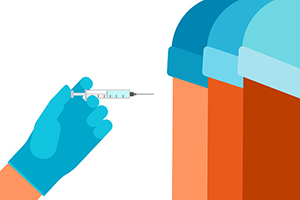Vaccinating adults aged 26 and older against the human papillomavirus (HPV) may not be cost-effective, according to a new study published by Kim et al in PLOS Medicine.
“Our study found that the added health benefit of increasing the vaccination age limit beyond 26 years is minimal, and that the cost-effectiveness is much lower than in preadolescents—the target age group for the HPV vaccine,” said lead study author Jane Kim, PhD, K.T. Li Professor of Health Economics at the Harvard T.H. Chan School of Public Health.
HPV vaccines have been shown to be highly effective in preventing HPV infections that are associated with cervical, anal, oropharyngeal, vulvar, vaginal, and penile cancers, as well as genital warts. Current U.S. guidelines recommend HPV vaccination for girls and boys at age 11 or 12, and catch-up vaccination for people through age 26 if they were not vaccinated when younger. For adults beyond age 26, the guidelines don’t specifically recommend catch-up vaccination but suggest that, for people aged 27 to 45, clinicians and patients make decisions about HPV vaccination on an individual basis.

Photo credit: Getty
Model of Extending Vaccination
The new study, undertaken to inform these national guidelines, used two mathematical models—from Harvard and Cancer Council New South Wales, Australia—that simulated scenarios of extending HPV vaccination to women and men up to age 45 years. Using U.S. data, the models projected cost and health outcomes of the six HPV-associated cancers and genital warts, taking into account historical and future vaccination uptake in younger people, cervical cancer screening practices among women, vaccine efficacy, and vaccination costs. The researchers sought to determine whether the benefits of HPV vaccination at older ages would have an incremental cost-effectiveness ratio (ICER) that was in line with a commonly cited upper threshold of $200,000 per quality-adjusted life year (QALY).
Findings
The researchers found that HPV vaccination beyond age 26 in the United States would provide limited health benefit at the population level, at a substantial cost, given current HPV vaccine prices. Their analysis showed that the ICER for vaccinating people up to age 45 years ranged from $315,700 to $440,600 per QALY gained.
Dr. Kim noted that current HPV vaccines are prophylactic and therefore most effective when given prior to HPV exposure, which can happen soon after sexual initiation; once someone is exposed to HPV, the vaccine won’t clear those infections.
“By the time you vaccinate individuals in their 30s and 40s, many have already been exposed to HPV, so the health benefit really decreases at these older ages,” she explained. “It’s also important to emphasize that cervical cancer screening remains an effective and cost-effective way to protect women from cervical cancer.”
The study results, which were previously reported to the Advisory Committee on Immunization Practices, helped inform the committee’s June 2019 recommendations to the Centers for Disease Control and Prevention on HPV vaccination.
“Other countries that are considering extending the upper age limit of HPV vaccination to include older adults should consider the opportunity costs of doing so,” concluded Dr. Kim.
Disclosure: Funding for the study came from the National Cancer Institute. For full disclosures of the study authors, visit journals.plos.org.

